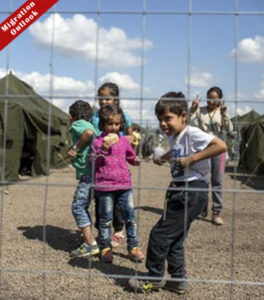Refugee intakes fall as economic migration booms – OECD
Successful humanitarian migration is falling across the globe as the numbers of people moving country for economic reasons has hit a record high. According to a new report from the Organisation for Economic Development (OECD).
The OECD International Migration Outlook 2019 says that asylum applications decreased to 1.09 million in 2018, 35 per cent fewer than the record high of 1.65 million requests registered in both 2015 and 2016.
 Most asylum seekers came from Afghanistan, followed by Syria, Iraq and Venezuela. Because of the drop in asylum applications, the number of registered refugees also declined, falling by 28 per cent.
Most asylum seekers came from Afghanistan, followed by Syria, Iraq and Venezuela. Because of the drop in asylum applications, the number of registered refugees also declined, falling by 28 per cent.
Migrants’ employment prospects continued to improve in 2018, building on the positive trends observed during the last five years, the report said.
On average across OECD countries, more than 68 per cent of migrants are employed and the unemployment rate has fallen below 9 per cent. However, young immigrants and low-educated immigrants still struggle in the labour market.
The Outlook also finds that OECD countries continue to adjust their labour migration programmes to improve selection and favour needed skills, including Australia.
A number of countries have also reformed their entry processes for migrants who are investors or have created new programmes for migrants developing start-ups. Some countries have introduced restrictions to family reunification procedures or streamlined their asylum procedures.
Family migration, where people migrate with, or to join, family members, increased by 9 per cent and labour migration by 6 per cent.
2018 also saw a sharp rise in the number of international students enrolled in tertiary education across the OECD, increasing by 7 per cent to over 3.5 million.
In Australia, the international student intake was more than half-a-million for the year – a 2 per cent increase on the previous year.
The United States, was the leading destination for students butr saw a decrease in student flows and a shrinking OECD market share.
The OECD report found family migrants comprised 40 per cent of total inflows, more than any other category. This broad category includes natives of OECD countries bringing spouses from abroad, but also immigrants arriving with accompanying family, or sponsoring their reunification.
More than half of immigrants who have family did not bring their family with them at first.
Delays in reunification affect spouses and their integration prospects, especially for women, the report said.
It identified a possible trade-off between stringent conditions on the integration of the principal migrant before family reunification is allowed and the integration of the spouse.
Long delays can also hurt the integration outcomes of migrant children, reducing their host-country language proficiency and education outcomes, the report said.












